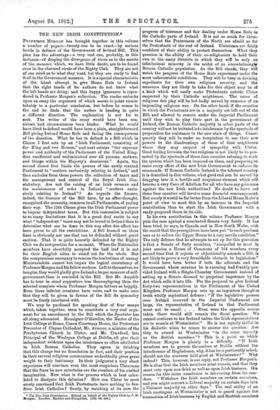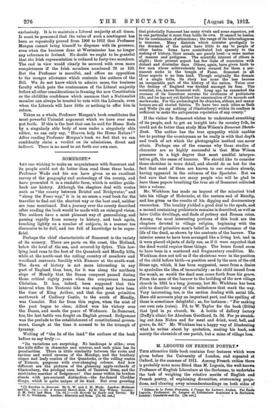THE NEW IRISH CONSTITUTION.* PROFESSOR IfonaaN has brought together in
this volume a number of papers—twenty-one to be exact—by various hands in defence of the Government of Ireland Bill. This plan has the advantage—a very real one, probably, in this instance—of draping the divergence of views as to the merits of the measure which, we have little doubt, are to be found, even in the charmed circle of the Eighty Club. They are not of one mind as to what they want, but they are ready to find it all in the Government measure. It is a special characteristic of the latest attempt to give Home Rule to Ireland that the right hands of its authors do not know what the left hands are doing; and this happy ignorance is repro- duced in Professor Morgan's collection. The reader embarks upon an essay the argument of which seems to point unmis- takably to a particular conclusion, but before he comes to the end he finds that the author is heading in quite a different direction. The explanation is not far to seek. The writer of the essay would have been con- sistent had circumstances been kinder. What he would have liked to defend would have been a plain, straightforward Bill giving Ireland Rome Rule and facing the consequences of the donation. What he has to defend is a Bill which in Clause 1 first sets up an " Irish Parliament, consisting of the King and two Houses," and next retains "the supreme power and authority of the Parliament of the United King- dom unaffected and undiminished over all persons, matters, and things within his Majesty's dominions." Again, the second clause first limits the powers of the newly created Parliament to " matters exclusively relating to Ireland," and then excludes from these powers the collection of taxes and the management and control of the Royal Irish Con- stabulary. Are not the raising of an Irish revenue and the maintenance of order in Ireland "matters exclu- sively relating to Ireland " P As regards the former, indeed, the framers of the Bill have, by an after-thought, recognized the necessity, common to all Parliaments, of paying their way. The 15th Clause gives the Irish Parliament power to impose independent taxes. But this concession is subject to so many limitations that it is a great deal easier to say what " independent " taxes may not be levied in Ireland than to determine what can be done in this way after due effect has been given to all the restrictions. A Bill framed on these lines is obviously not one that can be defended without great caution. That it is quite honestly defended by the Eighty Club we do not question for a moment. When the Nationalist members have oheerfully accepted the half loaf it is not for their English allies to stand out for the whole. But the compromises necessary to remove the hesitations of uneasy Ministerialists cannot but impair the logical consistency of Professor Morgan and his fellow workers. Left to themselves, we imagine, they would gladly give Ireland a larger measure of self- government than is conceded in the Bill. But Mr. Asquith has to bear in mind supporters less thoroughgoing than the selected essayists whom Professor Morgan fathers so happily. Even these inferior creatures have votes, and to make sure that they will. be given in favour of the Bill its symmetry must be freely interfered with.
We may be pardoned for speaking first of four essays which, taken together, seem to constitute a very real argu- ment for an amendment to the Bill which the Spectator has all along advocated. Monsignor O'Riordan, the Rector of the Irish College at Rome, Canon Courtenay Moore, the Protestant Precentor of Cloyne Cathedral, Mr. Armour, a minister of the Presbyterian Church in Ulster, and Mr. Crawford, late Principal of the Wesleyan College at Dublin, all give their independent evidence upon the intolerance so often attributed to Irish Roman Catholics. They agree in thinking that this charge has no foundation in fact, and their position in their several religions communions undoubtedly gives great weight to their testimony. In their judgment a very short experience will convince even the most suspicions Ulsterman that the fears he now entertains are the creation of his excited imagination. Now what is the process which is best calcu- lated to dissipate this delusion P How can Ulster be most surely convinced that Irish Protestants have nothing to fear from Irish Catholics P Surely, by watching at its ease the • The New Irish Constitution. Edited on behalf of the Eighty Club by d. H. Morgan. London: Hodder and Stoughton. [10s. 6d. netd
progress of tolerance and fair dealing under Home Rule in the Catholic parts of Ireland. It is not so much for them- selves that the Protestants of the North are afraid as for the Protestants of the rest of Ireland. Ulstermen are fairly confident of their ability to protect themselves. What they question is the ability of their co-religionists to hold their own in the many districts in which they will be only an infinitesimal minority in the midst of an overwhelming', Roman Catholic population. As the Bill stands, they will watch the progress of the Home Rule experiment under the most unfavourable conditions. They will be busy in devising expedients for ' their own religious security, and the measures they are likely to take for this object may be of a kind which will easily make Protestants outside Ulster suspected by their Catholic neighbours. The cause of religious fair play will be but badly served by rumours of "an impending religious war. On the other band, if the counties in which the Protestants are in a majority are left out of the Bill, and allowed to remain under the Imperial Parliament until they wish to play their part in the government of Ireland, the Roman Catholic majority in other parts of the country will not be irritated into intolerance by the spectacle of preparation for resistance to the new state of things. Cense.; quently they will be under no temptation to use their new powers to the disadvantage of those of their neighbours whom they may suspect of sympathy with Ulster. Good feeling between the two religions is not likely to be pro- moted by the spectacle of these four counties refusing to work the system which has been imposed on them, and preparing to resist every effort of the new Irish Government to enforce its commands. If Roman Catholic Ireland is the tolerant country it is described in this volume, what good end can be served by dragging into it a hostile and suspicious element which will become a very Cave of Adullam for all who have any grievance against the new Irish authorities P No doubt to leave out these four counties will involve some financial rearrangement. But surely it would be far better from the Liberal Home Ruler's point of view to meet this by an increase in the Imperial contribution than to start the Irish Government with a ready-prepared thorn in its aide.
In his own eontribution to this volume Professor Morgan puts the case against a nominated Senate very fairly. It has
been tried, he says, in Canada and in New South Wales, with
the result that the prerogatives have been put "to such partisan uses as to reduce the Upper House to a very servile condition."
The only defence that he attempts to set up for this provision is that a Senate of forty members, "compelled to meet in joint session a House of Commons of 164 members every second time that it rejects or objectionably amends a Bill, is not likely to prove a very formidable obstacle to legislation."
It would have been better if both the advocate and the Government whose measure he is excusing had frankly pro- vided Ireland with a Single-Chamber Government instead of setting up a Senate doomed to perpetual impotence by the Act which calls it into life. For the proposal to give Ireland forty-two representatives in the Parliament of the United Kingdom Professor Morgan sets up an ingenious though in truth wholly sophistical defence : " If the legislative powers over Ireland reserved to the Imperial Parliament are large, the representation of Ireland in that Parliament must not be small. . . . Even were the opposite course taken there would still remain the fiscal question. We cannot continue to tax Ireland unless the Irish representatives are to remain at Westminster." He is not equally skilful in his dialectic when he comes to answer the question : Are they to attend at Westminster "in the same capacity as the British members " ? This is a point on which Professor Morgan is plainly in a difficulty. "If Irish members are to govern themselves at Dublin without 'the interference of Englishmen, why, it has been pertinently asked, should not the converse hold good at Westminster ? " Why indeed I This, however, is our reply, not Professor Morgan's. He is clear that the Irish members must remain, and that they must vote upon non-Irish as well as upon Irish business. His reason for this latter conclusion is interesting from its can- dour. " Withdraw the Irish members on certain occasions, and you might convert a Liberal majority on certain days into a Unionist majority on other days." The real utility of an Irish contingent at Westminster is not to guard against the transaction of Irish business by English and Scottish members
exclusively. It is to maintain a Liberal majority at all times. It must be presumed that the value of such a contingent has been so repeatedly proved from 1906 to 1912 that Professor Morgan cannot bring himself to dispense with its presence, even when the business done at Westminster has no longer any reference to Ireland. No doubt we ought to be grateful that the Irish representation is reduced to forty-two members. The end in view would clearly be secured with even more completeness if the Irish members numbered 70 or 100. But the Professor is merciful, and offers no opposition to the meagre allowance which contents the authors of the Bill. We do not know which to admire more, the business faculty which puts the continuance of the Liberal majority before all other considerations in framing the new Constitution or the childlike confidence which assumes that a Nationalist member can always be trusted to vote with the Liberals, even when the Liberals will have little or nothing to offer him in return.
Taken as a whole, Professor Morgan's book constitutes the most powerful Unionist argument which we have ever seen put forth. If this is the best that can be said for Home Rule by a singularly able body of men under a singularly able editor, we can only say, "Heaven help the Home Rulers!" After reading Professor Morgan's book we feel that we can confidently claim a verdict on its admissions, direct and indirect. There is no need to set forth our own case.



































 Previous page
Previous page